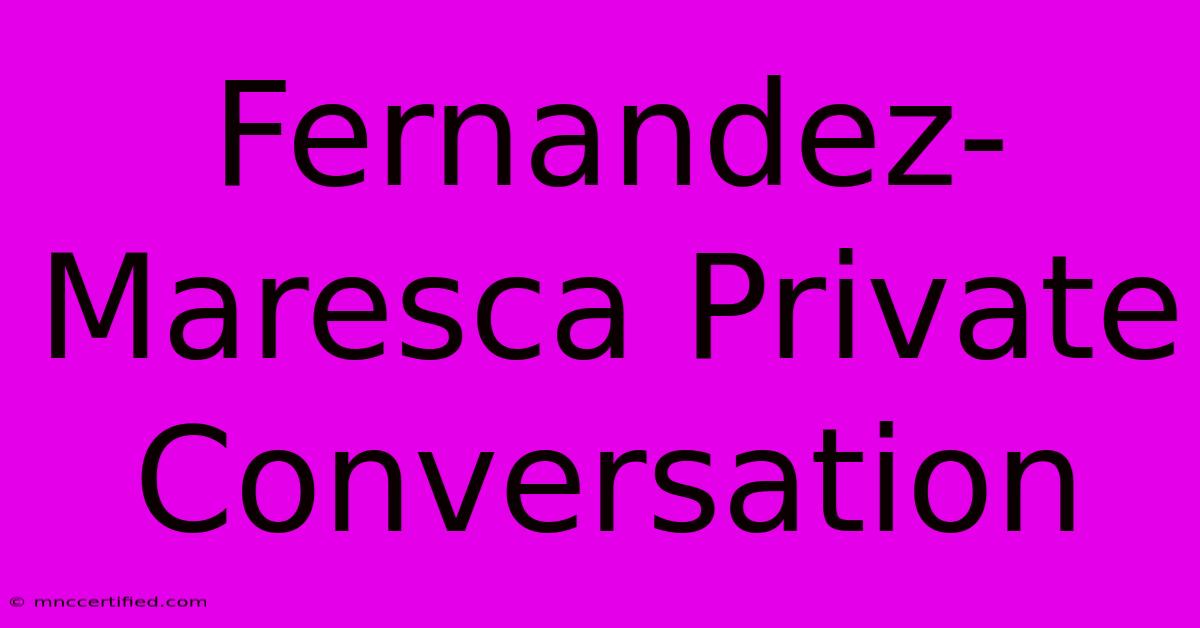Fernandez-Maresca Private Conversation

Table of Contents
Unpacking the Fernandez-Maresca Private Conversation: A Deep Dive into Privacy and the Public Eye
The term "Fernandez-Maresca private conversation" evokes intrigue and raises crucial questions about privacy, public figures, and the ethics of information sharing. While specifics about a specific conversation between individuals named Fernandez and Maresca are unavailable publicly (and intentionally so, if it's truly private), we can analyze the broader implications of private conversations entering the public domain. This exploration will cover the ethical considerations, legal ramifications, and the impact on reputation and trust.
The Ethical Minefield of Private Conversations
Private conversations, by their very nature, are intended to remain confidential. They represent a space for individuals to express themselves freely, share vulnerabilities, and build relationships without the pressure of public scrutiny. When such conversations are leaked or disclosed without consent, a serious breach of trust occurs. This betrayal erodes the foundation of personal relationships and can have devastating consequences. Ethical considerations center around:
- Consent: The most fundamental principle. Sharing a private conversation without explicit consent from all parties involved is inherently unethical.
- Confidentiality: A core tenet of many professions (legal, medical, journalistic) highlights the importance of protecting private information.
- Harm: The potential for emotional distress, reputational damage, and even legal repercussions from a disclosed private conversation must be considered.
Legal Ramifications of Private Conversation Disclosure
The legal implications of revealing private conversations vary significantly depending on jurisdiction and the specifics of the situation. Several legal avenues might be explored:
- Defamation: If the disclosed conversation contains false statements that harm someone's reputation, it could lead to a defamation lawsuit.
- Invasion of privacy: Laws protecting privacy vary by region, but many jurisdictions offer legal recourse for unauthorized disclosure of private communications. This could include claims for emotional distress or financial compensation.
- Breach of contract: If a confidentiality agreement (e.g., non-disclosure agreement or NDA) was in place, its breach could lead to legal action.
- Wiretapping laws: Illegally recorded conversations are typically inadmissible in court and can result in criminal charges.
It's crucial to consult legal counsel if you are involved in a situation involving the unauthorized disclosure of private conversations. Navigating legal issues requires expertise and a deep understanding of relevant laws.
The Impact on Reputation and Trust
The unauthorized release of a private conversation can severely damage the reputation of those involved. The public perception of individuals can shift dramatically, leading to loss of credibility, professional opportunities, and personal relationships. The impact extends beyond the individuals directly involved, potentially affecting their families and associates. Repairing damaged reputations after such an event is often a long and arduous process.
Protecting Your Private Conversations
Given the potential consequences, protecting the privacy of your conversations is essential. Consider these preventative measures:
- Be mindful of your audience: Think carefully about who you're talking to and the context of your conversation.
- Use secure communication channels: Opt for encrypted messaging apps or other secure communication methods.
- Avoid sensitive discussions in public places: Public spaces are easily overheard.
- Be wary of recording conversations: Always obtain consent before recording a conversation, and understand the legal ramifications in your jurisdiction.
The Fernandez-Maresca private conversation, while hypothetical in this context, serves as a powerful reminder of the importance of respecting privacy and the serious consequences of its violation. Protecting personal information requires vigilance and awareness of both the ethical and legal landscapes. Understanding these implications is critical in the digital age, where private information is constantly at risk.

Thank you for visiting our website wich cover about Fernandez-Maresca Private Conversation. We hope the information provided has been useful to you. Feel free to contact us if you have any questions or need further assistance. See you next time and dont miss to bookmark.
Featured Posts
-
Springboks Triumph Over Wales
Nov 24, 2024
-
Man Leaks Royals Singer Trade Details
Nov 24, 2024
-
Storm Bert Intensifies Travel Chaos
Nov 24, 2024
-
Storm Bert Approaches Wind Warning Surrey Hampshire
Nov 24, 2024
-
Smu 33 7 Virginia Game Recap Nov 23 2024
Nov 24, 2024